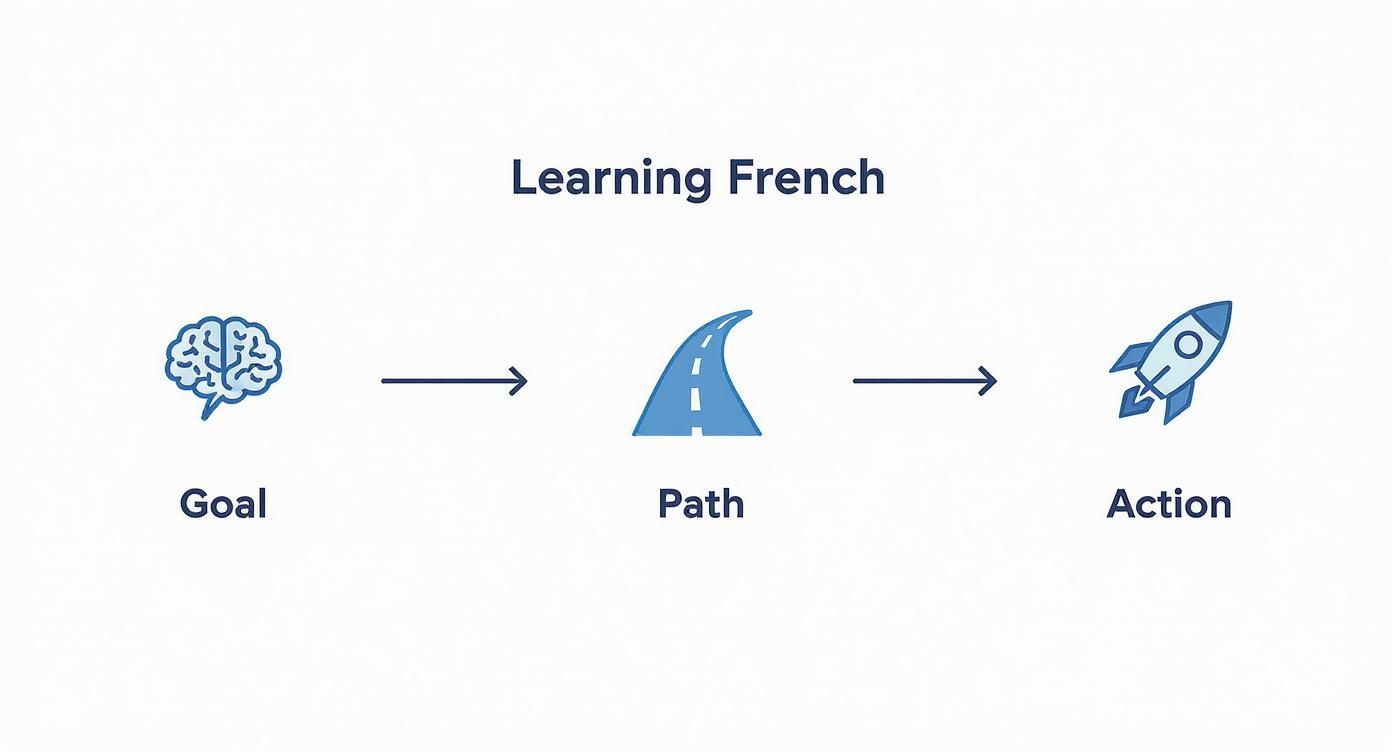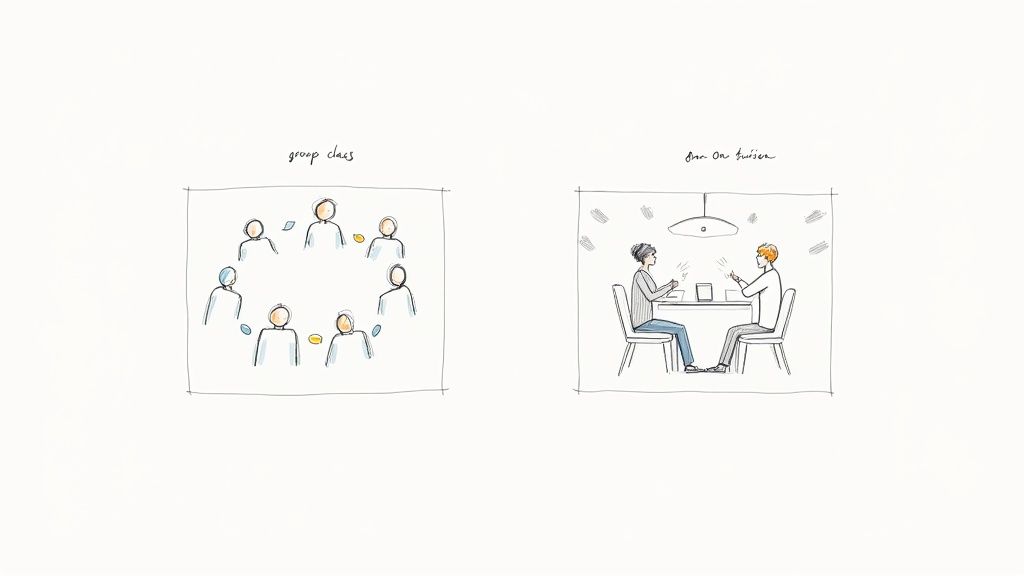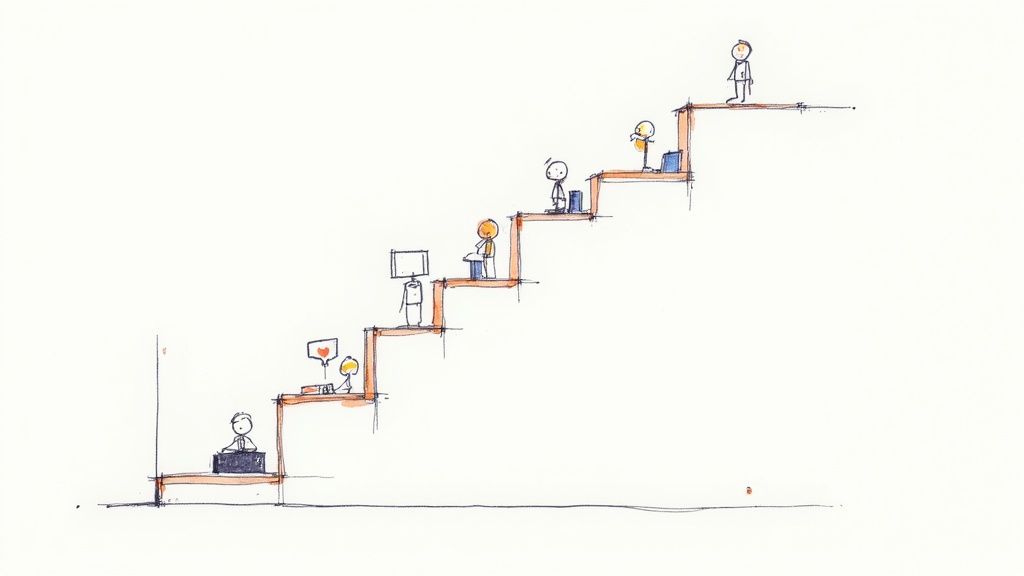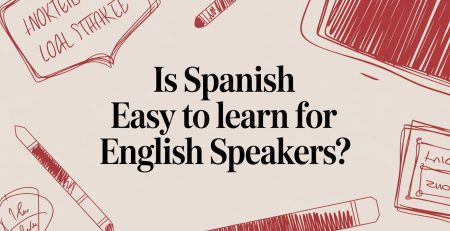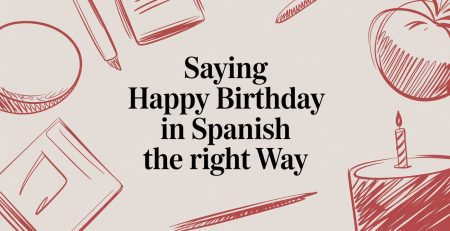Finding the Best French Language Classes in Singapore
So, you’re thinking about learning French in Singapore? It's a fantastic decision. Picking up a new language is always an adventure, but choosing the right class is the first real step. It's all about finding a fit for your goals, how you like to learn, and of course, your schedule.
Why Learn French in Singapore?
Let's be honest, in a buzzing, international city like Singapore, being able to speak another language isn't just a nice-to-have; it's a genuine advantage. French, in particular, carries a lot of weight. It’s an official language for huge global players like the United Nations and the Olympics, which can seriously boost your career prospects.
Jumping into a structured class gives you a clear roadmap. Trying to learn on your own can feel like wandering through a forest without a compass—you might find some interesting things, but you'll probably get lost. A good course provides the blueprint, taking you from the basic foundation of grammar and pronunciation to the more complex skills of fluent conversation, one logical step at a time.
The Perks of a Proper French Class
Sure, you could try learning with an app, but joining a real class has some serious upsides that are tough to replicate on your own.
- Expert Guidance: Nothing beats having a native-speaking teacher right there to correct your pronunciation on the spot. They catch those little mistakes before they turn into bad habits you can't shake.
- A Clear Path Forward: Most quality courses follow international standards like the Common European Framework of Reference for Languages (CEFR). This gives you a tangible sense of progress as you move from a beginner (A1) all the way to mastery (C2).
- Keeps You on Track: Let's face it, staying motivated is hard. When you have a class to show up for and classmates to practise with, you're much more likely to stick with it. It builds a sense of community and keeps you accountable.
As you start your French lessons, you'll quickly realise that fitting study time into a packed life is a challenge. Using one of the best daily planner apps can be a game-changer, helping you carve out dedicated time to practise and turn your goal of speaking French into a reality.
Choosing Your Learning Environment
So, you're ready to learn French. One of the first, and biggest, decisions you'll make is where you'll learn. Are you picturing yourself logging into a class from the comfort of your couch, or sitting in a bustling classroom surrounded by fellow students? Each option offers a totally different vibe, and the right one for you really boils down to your lifestyle, personality, and how you genuinely learn best.
Let’s unpack the two main settings for French language classes to see which fits you perfectly.
This simple breakdown can help you visualise the path ahead—starting with your end goal and working backwards to find the best way to get there.
The main idea? A clear goal makes choosing the right class so much easier.
The Flexibility of Online French Classes
It’s no surprise that online French classes have exploded in popularity. The convenience is simply undeniable. If you’re juggling a packed schedule, the freedom to learn from anywhere with a Wi-Fi signal is a game-changer. Forget the commute; you can connect with fantastic instructors from all over the globe without leaving home.
This format works brilliantly for disciplined, self-motivated learners who are comfortable using digital tools. You get to set your own pace, re-watch a tricky lesson as many times as you need, and use online resources to really nail down new concepts. For anyone with a bit of get-up-and-go, it’s a seriously efficient way to become fluent. If that sounds like you, our guide on how to learn French on your own has some great extra tips for independent study.
The Power of In-Person Immersion
Then there's the classic classroom experience. In-person classes offer a certain magic that technology can’t quite capture. There’s a special energy that comes from being in the same room as your teacher and classmates, creating a supportive and dynamic learning bubble. You get instant, face-to-face feedback on your accent and can dive into spontaneous conversations that just flow more naturally.
The structured setting of a physical classroom helps build a real sense of community and keeps you accountable. Learning alongside others on the same journey is a powerful motivator that keeps you coming back week after week.
This traditional approach is ideal for anyone who feeds off social interaction and prefers a more guided, teacher-led path. And let's be honest, established schools in Singapore have this down to a fine art. Take the Alliance Française de Singapour, for instance. They've been a pillar of French education here for 75 years, and with over 1,500 students each year and native-speaking teachers, they know a thing or two about creating an immersive environment.
So, which path should you take? A side-by-side look can make the choice clearer.
Comparing Online vs In-Person French Classes
This table breaks down the key differences to help you decide which learning environment aligns best with your needs and preferences.
| Feature | Online Classes | In-Person Classes |
|---|---|---|
| Convenience & Access | Learn from anywhere, no commute. Access to a global pool of instructors. | Fixed location and schedule. Requires travel time. |
| Learning Style | Ideal for self-disciplined, independent learners comfortable with technology. | Best for social learners who thrive on interaction and structure. |
| Interaction | Primarily through video calls and digital platforms. Can feel less spontaneous. | Direct, face-to-face interaction. Richer non-verbal cues and group dynamics. |
| Flexibility | High. Often allows for more flexible scheduling and self-paced learning. | Low. Follows a set schedule and curriculum pace for the entire group. |
| Accountability | Relies heavily on self-motivation. Easier to skip a class. | High. The presence of peers and a teacher provides external motivation. |
| Immersion | Can be immersive with the right tools, but requires more personal effort. | Naturally immersive environment with constant real-time practice. |
Ultimately, both online and in-person classes can get you to fluency. The best environment is simply the one where you feel most comfortable, engaged, and ready to dive into your French language journey.
Finding the Right Class Dynamic
Once you’ve weighed the pros and cons of online versus in-person learning, the next big question is about who you’ll be learning with. Are you someone who feeds off the energy of a group, or do you work best with the undivided attention of a mentor? This choice between a group class and private tuition is a huge factor that will define your experience with French language classes.
Think about it like choosing how to get fit. A group exercise class is fun, social, and full of shared motivation. But a personal training session is built entirely around you—your goals, your pace, your strengths. Both paths get you to the finish line, but they suit very different people. Let’s figure out which one is the right fit for your journey into French.
The Collaborative Energy of Group Classes
There’s a good reason group lessons are the go-to for so many learners. They create a vibrant, social setting that turns learning into a shared adventure instead of a solo mission. In a group, you're not just absorbing information from the teacher; you're also picking things up from your classmates' questions, mistakes, and lightbulb moments.
This kind of environment is perfect for sparking conversation. You’ll find yourself doing role-plays and practicing dialogues, which is exactly what you need to build real-world speaking confidence. Plus, hearing different accents and turns of phrase from other students helps train your ear and makes you a more flexible listener. For a lot of people, that sense of community is what keeps them coming back.
Group classes are a budget-friendly way to learn French and meet like-minded people. The shared journey often sparks friendships and creates a built-in support system, making the whole process feel less daunting and a lot more fun.
On top of that, group classes follow a set curriculum, so you get a clear, step-by-step progression through the language. Everyone moves through the material together, which creates a steady and predictable learning rhythm. This setup is ideal for sociable learners, beginners who thrive on structure, and anyone looking for an affordable way to get started.
The Precision of Private Tuition
Private tuition is the other side of the coin—it’s the personal training of the language world. This one-on-one setup gives you a level of customisation that’s simply unmatched. Your instructor builds the entire course around your specific needs, learning style, and ultimate goals.
Need to get your business French up to scratch for a new role? A private tutor will focus solely on that. Can’t seem to get your head around the subjunctive mood? You can dedicate a whole session to that single grammar point until it finally clicks. Because every minute is spent on what you need, progress can happen much, much faster.
Private lessons are a fantastic option for:
- Learners with very specific goals, like acing an exam or preparing to move to a French-speaking country.
- Students who feel they’re falling behind and need to catch up, or those who want to race ahead.
- Busy professionals who need a class schedule that can bend around their own commitments.
While private tuition comes with a higher price tag, the direct, constant feedback and accelerated pace often make it a very smart investment. If you're keen on more one-on-one practice, checking out a language exchange in Singapore can also be a great, informal way to supplement your lessons.
Ultimately, whether you lean towards the buzzing dynamic of a group or the focused attention of a private tutor, the goal is the same: find the environment where you feel confident, engaged, and ready to learn.
Understanding French Proficiency Levels
Before you can pick the right French class, you need a map. Think of learning a language like climbing a mountain—you wouldn't just start walking up without knowing the route, right? The most recognised map for this journey is the Common European Framework of Reference for Languages (CEFR).
This framework is the global standard, and it’s what top schools in Singapore use to structure their courses. It neatly breaks down fluency into six distinct levels, from A1 for absolute beginners all the way to C2 for complete mastery.
Knowing where you fit in helps you set realistic goals and find a class that feels just right—not too easy, not overwhelmingly difficult. It’s less about memorising grammar and more about what you can actually do with the language.
The A Levels: Basic User
The A levels are your foundation. This is where you lay the essential groundwork, moving from knowing zero French to handling simple, everyday situations with a bit of confidence.
-
A1 (Beginner): This is ground zero. You'll learn the absolute essentials: how to introduce yourself, ask and answer basic personal questions, and understand common phrases. By the end of A1, you'll be able to order a café au lait in Paris or tell someone your name and where you’re from.
-
A2 (Elementary): Here, you start building on those basics. You can manage routine tasks, talk a little about your background, and communicate what you need right now. You’re moving past just "survival phrases" and starting to have very short, simple conversations.
The B Levels: Independent User
Hitting the B levels is a huge milestone. This is where you shift from just repeating phrases to actually expressing your own thoughts and ideas. You’re becoming an independent French speaker.
B1 is often seen as the magic number for conversational fluency. At this point, you can handle most situations you’d encounter while travelling in France and chat about familiar topics like your work, hobbies, or current events.
This growing proficiency is why the demand for quality French education is on the rise in Singapore, especially for students in international programmes. The standards are incredibly high. For instance, the International French School (Singapore) recently celebrated a 100% pass rate for its 2025 French Baccalaureate, with a staggering 44.4% of students earning the highest honours. You can read more about these exceptional student achievements and what they mean for French education in Singapore.
- B2 (Upper Intermediate): At this level, conversations with native speakers start to feel natural. You can chat with a degree of spontaneity and fluency that makes real interaction possible. You're also able to grasp the main ideas of complex articles and write clearly on a wide range of subjects.
The C Levels: Proficient User
Welcome to the big leagues. The C levels represent true mastery of the language. You’re not just getting by anymore; you’re articulate, nuanced, and can use French with the same flexibility as a native speaker in any academic or professional setting.
-
C1 (Advanced): You can express yourself fluently and spontaneously without obviously grasping for words. You’re able to use French effectively for social, academic, and professional purposes, tailoring your language to the situation.
-
C2 (Mastery): This is the summit. You can understand pretty much everything you hear or read. You can summarise complex information from different sources and express yourself with precision, picking up on even the most subtle shades of meaning.
How to Evaluate Language Schools in Singapore
So you've figured out your learning style. Now comes the exciting part: finding the perfect French language class right here in Singapore. Choosing the right school is a big deal—it’s an investment of your time and money, so a little homework now pays off big time later. Your goal isn't just to find a place that teaches French, but one that teaches it in a way that truly clicks with you.
Think of it like picking a gym. Sure, they all have weights and treadmills, but the right one has the atmosphere, trainers, and community that actually make you want to show up. A language school is no different. The vibe and teaching philosophy matter just as much as the textbook.
Key Criteria for Your Checklist
When you start comparing schools, don't get distracted by flashy websites. Instead, focus on the things that actually shape your learning experience.
-
Instructor Qualifications: Are the teachers native French speakers? That's a great start for authentic pronunciation. But here’s the real kicker: are they certified to teach French as a foreign language (look for qualifications like DAEFLE or FLE)? A native speaker knows the language, but a trained teacher knows how to explain it. There's a big difference.
-
Teaching Methodology: You need to ask about their approach. Is it all about grammar drills and memorisation? Or do they push for immersive, real-world conversation from day one? The best modern schools use a communicative method, getting you to speak and interact from the very first lesson, which is fantastic for building confidence.
-
Class Size: This is a huge one. A smaller class, ideally with fewer than 10 students, means you get more one-on-one attention from the instructor. It also means you get more chances to actually speak, listen, and participate. In a massive class, it’s just too easy to get lost in the crowd.
Vetting Schools and Making Your Decision
Once you’ve got the basics down, it’s time to look for proof. What are current or former students saying? Reviews and testimonials offer a raw, unfiltered peek into what it’s actually like to learn there.
For instance, French Studio Language School often gets praise for its interactive methods and small class sizes. They've found that about 80% of their students see real, noticeable progress within six months, which speaks volumes about their focus on practical communication skills.
A great language school doesn’t just teach you vocabulary; it builds your confidence. Look for trial classes or open days to get a feel for the environment and teaching style before you commit to a full course.
While much of the advice out there is about online courses, you might find this guide on how to compare online learning programs helpful, as many of the core principles apply to in-person schools, too.
Ultimately, the right choice often comes down to a gut feeling. To get a more comprehensive view, be sure to check out our detailed guide on selecting a language school in Singapore.
Answering Your Questions About French Classes
As you get closer to picking the right French class, it’s completely normal for a few last-minute questions to pop up. This is a big decision, and getting clear answers is the best way to move forward with confidence. Think of this as your personal FAQ, where we’ll tackle the most common things we hear from people just like you.
We’ll cover everything from how long it really takes to get fluent, to what you can expect to budget, and whether those official exams are actually worth it. The idea is to clear up any lingering doubts so you can finalise your choice and start your French journey feeling fully prepared.
How Long Does It Take to Become Fluent in French?
Ah, the million-dollar question! The truth is, there’s no magic number. Fluency is a journey, not a final destination, and how quickly you get there really comes down to your background, how you study, and how much you can surround yourself with French.
For a native English speaker, a common benchmark you’ll see is around 600 to 750 hours of focused study to reach a professional working level. That might sound intimidating, but it’s much more manageable when you break it down.
The real secret to fluency isn't about cramming. It's all about consistency. A little bit of practice every single day is far more powerful than one long, draining session once a week. This gives your brain the time it needs to actually absorb and hold on to everything you’re learning.
If you’re consistent with your classes and weave a bit of daily practice into your life—like listening to a French podcast on your commute or reviewing new words before bed—most learners can reach a solid conversational level (what we call CEFR B1/B2) within 1.5 to 3 years. Ultimately, your own motivation and passion for the language will be the biggest drivers in speeding things up.
What Is the Average Cost of French Classes in Singapore?
Budget is always a practical thing to consider, and the cost of French classes in Singapore can vary quite a bit based on the format you go for.
-
Group Classes: These are usually the most budget-friendly route. For a standard term of about 10-12 weeks, you can expect to pay somewhere between S$300 and S$600 at most established language centres. It’s a great-value option for structured learning in a fun, social setting.
-
Private Lessons: If you’re after one-on-one, personalised coaching, the price point is higher. Private tuition typically falls in the S$70 to S$120 per hour range, which depends on the teacher's experience and background.
When you're comparing prices, remember to look beyond the headline number. It’s always worth asking if course materials, registration fees, or access to things like cultural workshops are included. Knowing what’s in the full package helps you see the true value of your investment.
Do I Need Prior Language Experience to Start?
Not at all! Every single fluent speaker started from zero. Any reputable language school will have beginner courses—often called A1 level—that are built specifically for people with absolutely no background in French.
These foundational classes start right at the beginning. You’ll learn the alphabet, basic pronunciation, and simple greetings like "Bonjour" and "Merci." The whole point is to create a supportive and encouraging space where you never feel out of your depth. The only things you really need to bring are a good attitude and a readiness to practise.
Are Certifications Like the DELF or DALF Important?
Whether you need an official certificate really depends on your goals. The DELF (Diplôme d'Études en Langue Française) and DALF (Diplôme Approfondi de Langue Française) are official diplomas handed out by the French Ministry of Education.
These are recognised all over the world and carry a lot of weight. They become pretty much essential if you have specific plans, like:
- Studying at a university in France or another French-speaking country.
- Applying for a job that asks for official proof of your French skills.
- Needing paperwork for immigration to places like Canada or France.
If you're learning just for fun, travel, or personal growth, you don't really need to worry about these exams. That said, they can be fantastic motivators, giving you clear goals to work towards and a real, tangible way to measure how far you’ve come.
Ready to start your journey with a new language? At Spanish Council Singapore, we bring the same passion for teaching to Spanish learners. Our native, certified teachers offer personalised private and small-group lessons to help you achieve fluency effectively. Discover our courses today at https://spanish.sg.


